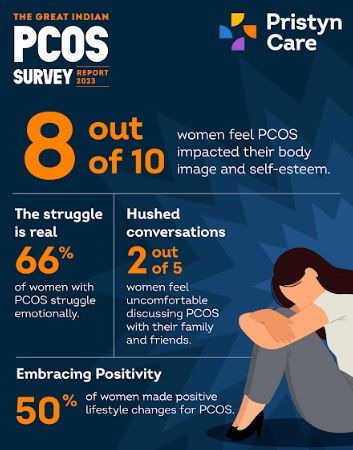- A staggering 60% of women lack awareness of the critical health risks linked to PCOS
- 66% of women have experienced mental and emotional struggles due to PCOS
Gurugram, NFAPost: September is recognized as PCOS Awareness Month, dedicated to increasing awareness and educating women about Polycystic Ovary Syndrome (PCOS). It is a condition that often goes undiagnosed, making it one of the most overlooked diseases globally. Pristyn Data Labs recently conducted an extensive study involving 2,000 women from diverse backgrounds across the country, uncovering crucial findings that emphasize the need for more awareness and support for those dealing with PCOS.
According to the study, 8 out of 10 respondents shared that PCOS had, in one way or another, impacted their self-esteem and body image. This impact primarily resulted from factors like excess hair growth, acne, weight gain, and irregular periods. The data from the study also revealed a profound emotional and mental health impact of PCOS on women, with 66% of respondents diagnosed with PCOS reporting emotional distress, including stress, anxiety, and depression.
Regarding medical advice and PCOS management, 74% of women who participated in the survey were diagnosed with PCOS and took the proactive step of seeking essential medical advice to address their condition. Furthermore, more than 50% of these women have also embraced positive lifestyle changes to effectively manage PCOS symptoms, including dietary adjustments, regular exercise, and weight management.
Commenting on the findings, Dr. Garima Sawhney, Senior Gynecologist, and Co-founder of Pristyn Care said, “This study has highlighted the critical need for increased awareness, early detection, and comprehensive support for individuals dealing with PCOS. PCOS isn’t merely a medical issue; it poses a pervasive challenge that significantly affects the well-being of numerous women. Furthermore, our findings indicate that two out of every five women hesitate to discuss PCOS with their family and friends, emphasizing the vital significance of nurturing open communication and strong support networks. To effectively address these concerns, it is crucial to prioritize awareness and holistic care, empowering these individuals on their path to improved health and greater happiness.”
The survey also revealed that 6 out of 10 women lack basic awareness of the critical health risks linked to PCOS, highlighting the need for education. On a positive note, when it comes to family planning, 52% mentioned that PCOS had no impact on their plans, while 37% encountered challenges conceiving due to PCOS. 12% of respondents successfully conceived despite their condition. This data underscores the essential need for customized support and guidance when managing family planning amidst the complexities of PCOS.





